28 nov 2018
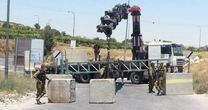
The Israeli occupation army closed off on Wednesday morning the main entrances to Qalqilya province, blocking Palestinians’ access out of and into the area.
Local sources said Israeli soldiers abruptly sealed off Qalqilya’s eastern access road among other vital thoroughfares in the area.
Palestinian vehicles and civilians have lined up in the streets, trying to reach their homes and workplaces.
The Israeli military routinely closes off vital access roads across the occupied Palestinian territories under the security pretext, breaching Palestinians’ right to free movement.
Local sources said Israeli soldiers abruptly sealed off Qalqilya’s eastern access road among other vital thoroughfares in the area.
Palestinian vehicles and civilians have lined up in the streets, trying to reach their homes and workplaces.
The Israeli military routinely closes off vital access roads across the occupied Palestinian territories under the security pretext, breaching Palestinians’ right to free movement.
27 nov 2018
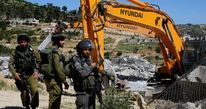
sraeli military bulldozers demolished on Tuesday a Palestinian-owned agricultural facility in Jiftlik village, north of Jericho, for being built without permit.
Local activist Aref Daraghmeh told Quds Press that Israeli bulldozers stormed the village early today escorted by large numbers of Israeli forces before starting the demolition process.
The demolished facility was owned by Jabr 'Adais, he added.
Local activist Aref Daraghmeh told Quds Press that Israeli bulldozers stormed the village early today escorted by large numbers of Israeli forces before starting the demolition process.
The demolished facility was owned by Jabr 'Adais, he added.
26 nov 2018
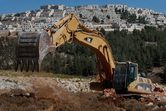
Israeli forces, on Monday, distributed demolition notices for three houses and a shed belonging to Palestinians in al-Khalidiya area, southeast of Yatta town, to the south of Hebron, said a local activist.
The popular committee coordinator in Yatta, Rateb al-Jabour, told WAFA correspondence that Israeli forces handed, to three brothers from the Rabee family, demolition notices for their three houses and a shed used as an animal shelter.
The activist denounced the Israeli measures, which, he stressed, aim to take over the land for the benefit of settlement expansion, calling on Palestinians to remain steadfast in the face of such measures.
The popular committee coordinator in Yatta, Rateb al-Jabour, told WAFA correspondence that Israeli forces handed, to three brothers from the Rabee family, demolition notices for their three houses and a shed used as an animal shelter.
The activist denounced the Israeli measures, which, he stressed, aim to take over the land for the benefit of settlement expansion, calling on Palestinians to remain steadfast in the face of such measures.

Israeli settlers on Monday seized a new Palestinian-owned land in Jaloud town, south of the West Bank city of Nablus.
Anti-settlement researcher Ghassan Daghlas said that Israeli settlers living in Ahiya outpost, built illegally on Jaloud lands, seized a privately-owned land close to Palestinian houses located in Area C and threatened with demolition.
The land covers an area of 10 dunums, part of which has been planted with olive and fig trees for decades. It is owned by three Palestinian families in Jaloud and they have been barred from entering the land since 2001 when Israel announced it a closed military zone.
Daghlas said that Israel's land grab activity has been stepped up in Jaloud recently with the aim of adding settlement units to existing outposts in the area, establishing new outposts, and bringing more settlers to live there.
Anti-settlement researcher Ghassan Daghlas said that Israeli settlers living in Ahiya outpost, built illegally on Jaloud lands, seized a privately-owned land close to Palestinian houses located in Area C and threatened with demolition.
The land covers an area of 10 dunums, part of which has been planted with olive and fig trees for decades. It is owned by three Palestinian families in Jaloud and they have been barred from entering the land since 2001 when Israel announced it a closed military zone.
Daghlas said that Israel's land grab activity has been stepped up in Jaloud recently with the aim of adding settlement units to existing outposts in the area, establishing new outposts, and bringing more settlers to live there.
25 nov 2018
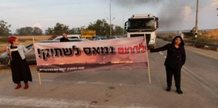
On Sunday morning, dozens of Israeli settlers from the Gaza enclave settlements rallied to block the roads leading to the Karm Abu Salem crossing, to prevent the arrival of trucks to the Gaza Strip.
According to the PNN, Kan Hebrew website reported that about 100 settlers living in the Gaza Strip, this morning, carried out demonstrations on the road to the settlement of Eshkol, to protest what they called the “security situation in the south” and the continuation of Palestinian demonstrations on the border with the Gaza Strip.
Dozens of settlers reportedly closed the roads leading to the Kerem Shalom crossing and intercepted goods trucks on their way to the Gaza Strip, demanding the Israeli government to achieve calm in the south.
The website said that the majority of participants, in these demonstrations, are students of secondary schools in the Gaza envelope settlements.
According to the PNN, Kan Hebrew website reported that about 100 settlers living in the Gaza Strip, this morning, carried out demonstrations on the road to the settlement of Eshkol, to protest what they called the “security situation in the south” and the continuation of Palestinian demonstrations on the border with the Gaza Strip.
Dozens of settlers reportedly closed the roads leading to the Kerem Shalom crossing and intercepted goods trucks on their way to the Gaza Strip, demanding the Israeli government to achieve calm in the south.
The website said that the majority of participants, in these demonstrations, are students of secondary schools in the Gaza envelope settlements.

Gaza's Ministry of Health said that the first shipment of medical drugs sent by the Japanese government arrived in the besieged territory on Sunday.
Head of International Cooperation at the Ministry of Health Ashraf Abu Mahady said in a press conference that Japan has many contributions in supporting the health sector in the Gaza Strip, the most recent of which was opening an early detection unit for breast cancer and providing al-Shifa Hospital with medical supplies.
Abu Mahady thanked the Japanese embassy and Japan International Cooperation Agency (JICA) for their great efforts in supporting the health sector and meeting the humanitarian needs of the Palestinian citizens in Gaza.
He added that Japan will soon launch a new project aimed at helping and rehabilitating the Palestinians injured in the Great March of Return.
A representative of the Japanese embassy said that the drug shipment is part of $1 million donations provided by the Japanese government and people.
"Gaza and Japan have the same spirit. Both of them are able to rise again from the ashes," she added.
Head of International Cooperation at the Ministry of Health Ashraf Abu Mahady said in a press conference that Japan has many contributions in supporting the health sector in the Gaza Strip, the most recent of which was opening an early detection unit for breast cancer and providing al-Shifa Hospital with medical supplies.
Abu Mahady thanked the Japanese embassy and Japan International Cooperation Agency (JICA) for their great efforts in supporting the health sector and meeting the humanitarian needs of the Palestinian citizens in Gaza.
He added that Japan will soon launch a new project aimed at helping and rehabilitating the Palestinians injured in the Great March of Return.
A representative of the Japanese embassy said that the drug shipment is part of $1 million donations provided by the Japanese government and people.
"Gaza and Japan have the same spirit. Both of them are able to rise again from the ashes," she added.

After Israel’s settlement expansion has devoured the bulk of Qaryut town in southern Nablus, especially in Area C of the occupied West Bank, settlers’ eyes are now directed at Area B in order to steal the remaining tracts of land from this settlement-afflicted town.
What has exposed Israel’s settlement expansionism in Area B is the attempt of the municipal council of Qaryut to build an agricultural road leading to the Palestinian area of Batisha in the west of the town and near the illegal settlement of Eli.
Just immediately after the town’s municipal council embarked on carrying out the road project, dozens of Jewish settlers attacked Palestinian workmen and physically assaulted them, and later Israeli soldiers intervened and forced the workers to stop building the road and leave the area with their equipment.
Less than a week later, the road workers returned to the area to resume their work, but Israeli forces stormed the site and forced them again to leave at gunpoint.
The area of Batisha in Qaryut contains vast tracts of land that are planted with olive trees, and it is considered the only remaining agricultural area which Qaryut residents can reach almost freely because it is located in Area B, which is under the Palestinian civil jurisdiction according to the classifications stipulated by Oslo Accords.
Qaryut is located about 26 kilometers to the south of Nablus and its total area is approximately 20,000 dunums of land, of which 14,000 dunums are located within Area C according to Oslo Accords. However, the residents of Qaryut are allowed to build only on 360 dunums of land.
It is one of the Palestinian towns and villages that are systematically targeted by the Israeli occupation state and Jewish settlers. Thousands of dunums of its land have been seized to build and expand illegal settlements.
Israeli settlements encircle Qaryut from all sides and they keep encroaching into further territory, eliminating any possibility for the native population to expand their residential and agricultural areas.
The settlements built on grabbed land in the town are Eli, established in 1984, and Shvut Rachel, 1995, and Shiloh, 1979. There are also the outposts of Hioval, Givat Ariel, Kida, and Adei Ad.
These settlements and outposts devoured 65 percent of the total area of Qaryut (about 14,000 dunums of land).
Such systematic settlement expansion and activity in Qaryut and its nearby areas are aimed at forcing the native population to migrate in order to connect the three settlements in the town with each other and make them one huge settlement bloc extending from Ariel settlement to the Jordan Valley in the east.
What has exposed Israel’s settlement expansionism in Area B is the attempt of the municipal council of Qaryut to build an agricultural road leading to the Palestinian area of Batisha in the west of the town and near the illegal settlement of Eli.
Just immediately after the town’s municipal council embarked on carrying out the road project, dozens of Jewish settlers attacked Palestinian workmen and physically assaulted them, and later Israeli soldiers intervened and forced the workers to stop building the road and leave the area with their equipment.
Less than a week later, the road workers returned to the area to resume their work, but Israeli forces stormed the site and forced them again to leave at gunpoint.
The area of Batisha in Qaryut contains vast tracts of land that are planted with olive trees, and it is considered the only remaining agricultural area which Qaryut residents can reach almost freely because it is located in Area B, which is under the Palestinian civil jurisdiction according to the classifications stipulated by Oslo Accords.
Qaryut is located about 26 kilometers to the south of Nablus and its total area is approximately 20,000 dunums of land, of which 14,000 dunums are located within Area C according to Oslo Accords. However, the residents of Qaryut are allowed to build only on 360 dunums of land.
It is one of the Palestinian towns and villages that are systematically targeted by the Israeli occupation state and Jewish settlers. Thousands of dunums of its land have been seized to build and expand illegal settlements.
Israeli settlements encircle Qaryut from all sides and they keep encroaching into further territory, eliminating any possibility for the native population to expand their residential and agricultural areas.
The settlements built on grabbed land in the town are Eli, established in 1984, and Shvut Rachel, 1995, and Shiloh, 1979. There are also the outposts of Hioval, Givat Ariel, Kida, and Adei Ad.
These settlements and outposts devoured 65 percent of the total area of Qaryut (about 14,000 dunums of land).
Such systematic settlement expansion and activity in Qaryut and its nearby areas are aimed at forcing the native population to migrate in order to connect the three settlements in the town with each other and make them one huge settlement bloc extending from Ariel settlement to the Jordan Valley in the east.

Olive oil mills in the Gaza Strip are silent in November for the first time in history. The olive oil season usually begins in early October and lasts until early December. However, 2018 witnessed an early departure of the season.
Olive oil mills have closed their doors to the few customers who came with small quantities of olives this season. The crippling blockade and deteriorating economy have added insult to injury.
The Ministry of Agriculture announced that 38,587 dunums of Gaza land were planted with olives, 31,000 of which had crops. The Ministry said that each dunum produced 580 kg of olives in 2018 because of high temperature and severe crop failure.
The Ministry estimated that olive oil mills will produce 2,100 tons of oil in 2018, while Gaza's consumption of olive oil is usually close to 4,000 tons. It added that the repeated closure of Gaza crossings has adversely affected the season.
Due to the poor olive harvest, the 29 olive oil mills scattered in the Gaza Strip have finished their work three weeks earlier.
Last day of work
After prior arrangements, the Palestinian citizen Nasr Oudeh, who owns the largest olive oil mills in the Gaza Strip, has prepared a production line to receive the last amount of olives that was delayed for the purpose of raising prices.
Nasr Oudeh said that the olive oil season of 2018 ended early due to severe crop failures amounting to 75%-80%. The prices ranged 70-90 Jordanian dinars per bottle (16 kg).
"Workers at Gaza olive oil mills refused to receive any imported oil," Oudeh told the PIC, adding that Israel's tightened blockade is a major reason for the low prices.
A ton of olives is usually pressed for 350 NIS, a price that might change a little based on supply and demand.
The Israeli occupation since 2000 has bulldozed thousands of dunums of land planted with olive trees in the Gaza Strip.
Oudeh, who has worked in the field of olive oil market for over 30 years, called for planting more and more lands with olive trees. He said that Gaza is likely to start exporting olive oil by 2020.
Silent machines
Disappointment is the case at the olive oil mill of Haj Ramadan Dalloul, a place passed from one generation to another over decades.
Ramadan Dalloul told the PIC that the olive harvest was poor this season, and that work started at his mill on 17 October but did not last for 40 days as usual.
"The crops are rich in oil but the olive harvest was poor. The past years were better," he added.
Dalloul's customers came to press their olive harvest as every year, but those who used to carry a ton of olives with them came this year with only one-quarter of the amount.
"We are 10 brothers and their children in the mill. In such days the season reaches its peak. We finished work too early. Weeks of preparation and maintenance were lost in vain. We earned nothing," Dalloul said.
During this time of the year, the air along Salah al-Din Road, the main highway of the Gaza Strip, used to be filled with the smell of freshly pressed olives, but the atmosphere is different this year.
Olive oil mills have closed their doors to the few customers who came with small quantities of olives this season. The crippling blockade and deteriorating economy have added insult to injury.
The Ministry of Agriculture announced that 38,587 dunums of Gaza land were planted with olives, 31,000 of which had crops. The Ministry said that each dunum produced 580 kg of olives in 2018 because of high temperature and severe crop failure.
The Ministry estimated that olive oil mills will produce 2,100 tons of oil in 2018, while Gaza's consumption of olive oil is usually close to 4,000 tons. It added that the repeated closure of Gaza crossings has adversely affected the season.
Due to the poor olive harvest, the 29 olive oil mills scattered in the Gaza Strip have finished their work three weeks earlier.
Last day of work
After prior arrangements, the Palestinian citizen Nasr Oudeh, who owns the largest olive oil mills in the Gaza Strip, has prepared a production line to receive the last amount of olives that was delayed for the purpose of raising prices.
Nasr Oudeh said that the olive oil season of 2018 ended early due to severe crop failures amounting to 75%-80%. The prices ranged 70-90 Jordanian dinars per bottle (16 kg).
"Workers at Gaza olive oil mills refused to receive any imported oil," Oudeh told the PIC, adding that Israel's tightened blockade is a major reason for the low prices.
A ton of olives is usually pressed for 350 NIS, a price that might change a little based on supply and demand.
The Israeli occupation since 2000 has bulldozed thousands of dunums of land planted with olive trees in the Gaza Strip.
Oudeh, who has worked in the field of olive oil market for over 30 years, called for planting more and more lands with olive trees. He said that Gaza is likely to start exporting olive oil by 2020.
Silent machines
Disappointment is the case at the olive oil mill of Haj Ramadan Dalloul, a place passed from one generation to another over decades.
Ramadan Dalloul told the PIC that the olive harvest was poor this season, and that work started at his mill on 17 October but did not last for 40 days as usual.
"The crops are rich in oil but the olive harvest was poor. The past years were better," he added.
Dalloul's customers came to press their olive harvest as every year, but those who used to carry a ton of olives with them came this year with only one-quarter of the amount.
"We are 10 brothers and their children in the mill. In such days the season reaches its peak. We finished work too early. Weeks of preparation and maintenance were lost in vain. We earned nothing," Dalloul said.
During this time of the year, the air along Salah al-Din Road, the main highway of the Gaza Strip, used to be filled with the smell of freshly pressed olives, but the atmosphere is different this year.

The United States Agency for International Development (USAID) has announced that half of its employees in the West Bank and Gaza will be laid off in the coming weeks, and by early 2019, the operations will be completely shut down.
Israeli officials reportedly voiced fears that such US decision would aggravate the humanitarian and security situation in Gaza and the occupied Palestinian territories, according to Haaretz newspaper.
The US department of state informed USAID last week that by next month the agency would have to present a list of 60 percent of its employees to be dismissed as the first step in the shutdown that will be finalized by 2019.
This US federal government agency handles civilian assistance to various countries around the world. It started operating in the West Bank and Gaza in 1994, focusing mainly on economic issues, including water, infrastructure, education and health.
USAID also buys medical equipment, provides humanitarian assistance to those in need of medical care and teaches lifesaving techniques to doctors from Gaza and the West Bank. In recent years USAID has conducted in-service education for teachers, built schools and worked on projects to keep young Palestinians in the education system.
After US president Donald Trump’s decided to freeze funding to various Palestinian relief organizations, dozens of USAID projects in the West Bank and Gaza were suspended, including those that had been partially completed.
Israeli security and military officials are reportedly concerned about the consequences of the suspension of USAID’s work.
Senior army officials already warned that the US suspension of financial assistance to UNRWA would worsen the situation in Gaza. UNRWA provides basic food to 1.3 million people in the Gaza Strip, 4 million doctor visits annually to Gaza residents and employs 12,000 teachers who teach about 300,000 children.
While aid to UNRWA is more significant than the USAID, the cessation of the activities of both agencies will lead to a decline in the humanitarian situation in the Strip and even to its collapse.
Such developments have prompted Israeli officials to warn that Israel would pay the price in terms of sanitation, security and economy.
Israeli officials reportedly voiced fears that such US decision would aggravate the humanitarian and security situation in Gaza and the occupied Palestinian territories, according to Haaretz newspaper.
The US department of state informed USAID last week that by next month the agency would have to present a list of 60 percent of its employees to be dismissed as the first step in the shutdown that will be finalized by 2019.
This US federal government agency handles civilian assistance to various countries around the world. It started operating in the West Bank and Gaza in 1994, focusing mainly on economic issues, including water, infrastructure, education and health.
USAID also buys medical equipment, provides humanitarian assistance to those in need of medical care and teaches lifesaving techniques to doctors from Gaza and the West Bank. In recent years USAID has conducted in-service education for teachers, built schools and worked on projects to keep young Palestinians in the education system.
After US president Donald Trump’s decided to freeze funding to various Palestinian relief organizations, dozens of USAID projects in the West Bank and Gaza were suspended, including those that had been partially completed.
Israeli security and military officials are reportedly concerned about the consequences of the suspension of USAID’s work.
Senior army officials already warned that the US suspension of financial assistance to UNRWA would worsen the situation in Gaza. UNRWA provides basic food to 1.3 million people in the Gaza Strip, 4 million doctor visits annually to Gaza residents and employs 12,000 teachers who teach about 300,000 children.
While aid to UNRWA is more significant than the USAID, the cessation of the activities of both agencies will lead to a decline in the humanitarian situation in the Strip and even to its collapse.
Such developments have prompted Israeli officials to warn that Israel would pay the price in terms of sanitation, security and economy.
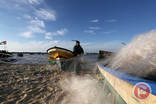
Israeli naval forces opened fire at Palestinian fishermen, on Sunday, off the coast of the southern and northern besieged Gaza Strip.
Locals told Ma’an that Israeli naval forces repeatedly opened heavy fire towards Palestinian fishermen in southern and northern Gaza, forcing fishing boats to sail back to shore.
No injuries were reported from the incidents.
The Israeli army regularly detains and opens fire on unarmed Palestinian fishermen, shepherds, and farmers along the border areas if they approach the unilaterally declared buffer zone.
Israeli human rights group B'Tselem recently concluded that Israel's Gaza closure and "harassment of fishermen" have been "destroying Gaza's fishing sector," with 95% of fishermen living below the poverty line.
Locals told Ma’an that Israeli naval forces repeatedly opened heavy fire towards Palestinian fishermen in southern and northern Gaza, forcing fishing boats to sail back to shore.
No injuries were reported from the incidents.
The Israeli army regularly detains and opens fire on unarmed Palestinian fishermen, shepherds, and farmers along the border areas if they approach the unilaterally declared buffer zone.
Israeli human rights group B'Tselem recently concluded that Israel's Gaza closure and "harassment of fishermen" have been "destroying Gaza's fishing sector," with 95% of fishermen living below the poverty line.
Page: 42 - 41 - 40 - 39 - 38 - 37 - 36 - 35 - 34 - 33 - 32 - 31 - 30 - 29 - 28 - 27 - 26 - 25 - 24 - 23 - 22 - 21
